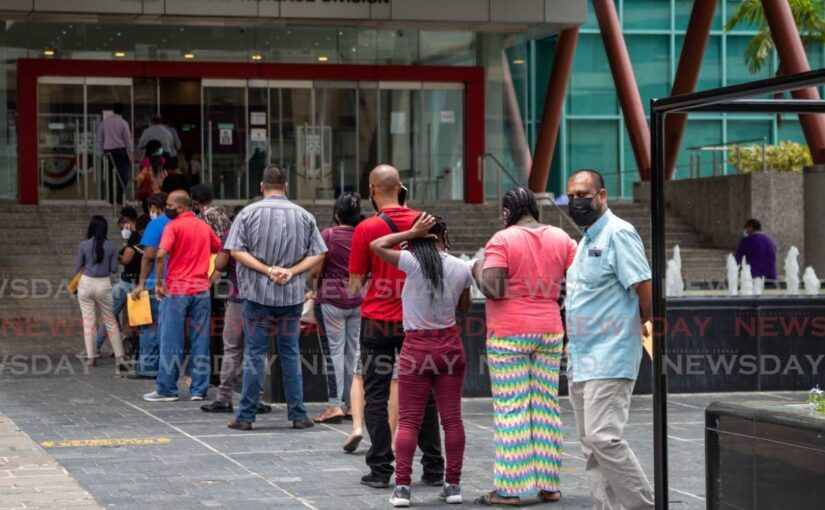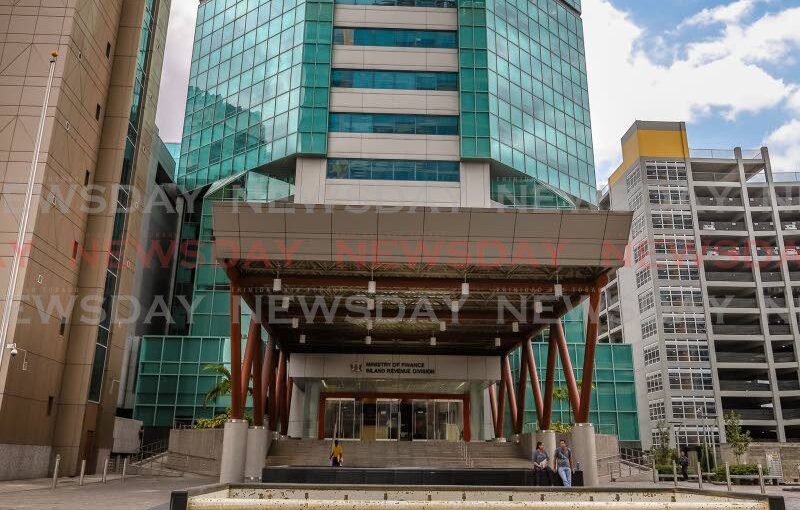FINANCE Minister Colm Imbert says Opposition Senator Wade Mark is asking questions he already knows the answers to. Imbert was responding to a...
Vous n'êtes pas connecté
- English
- Français
- عربي
- Español
- Deutsch
- Português
- русский язык
- Català
- Italiano
- Nederlands, Vlaams
- Norsk
- فارسی
- বাংলা
- اردو
- Azərbaycan dili
- Bahasa Indonesia
- Հայերեն
- Ελληνικά
- Bosanski jezik
- українська мова
- Íslenska
- Türkmen, Түркмен
- Türkçe
- Shqip
- Eesti keel
- magyar
- Қазақ тілі
- Kalaallisut ; kalaallit oqaasii
- Lietuvių kalba
- Latviešu valoda
- македонски јазик
- Монгол
- Bahasa Melayu ; بهاس ملايو
- ဗမာစာ
- Slovenščina
- тоҷикӣ ; toğikī ; تاجیکی
- ไทย
- O'zbek ; Ўзбек ; أۇزبېك
- Tiếng Việt
- ភាសាខ្មែរ
- རྫོང་ཁ
- Soomaaliga ; af Soomaali
Rubriques :
 Maroc - NEWSDAY.CO.TT - A la Une - 08/Aug 06:41
Maroc - NEWSDAY.CO.TT - A la Une - 08/Aug 06:41
‘Inevitable’ property tax deadline looms
The deadline for paying property tax is not expected to be postponed any further, and taxpayers are now lining up at the Board of Inland Revenue (BIR) and district revenue offices to beat any anticipated rush. “Most of them (paying the tax) are elderly people,” a security guard at the BIR's Port of Spain head office told Business Day during a visit to gauge the crowds on August 6. About 12 people were lining up to ensure their documents were in order before paying. Business Day tried to get information from one of the clerks, but was asked to allow the customers who intended to pay their taxes a chance to get help first. A clerk told Newsday to call 800-TAXX (the ministry’s e-Tax information hotline) for immediate queries. Details about the government’s property tax collection from March to now are hard to obtain anywhere. But the sum received by the BIR is believed to be significantly higher than the $1.3 million that Finance Minister Colm Imbert revealed had been collected since payments began in January to mid-March. Business Day was unable to speak to Commissioner of Valuations Emeris Garraway-Howell and assistant Shiva Kissoon for an update on the ministry’s progress with property-tax collection as the September 30 deadline approaches. Minister in the Ministry of Finance Brian Manning was also unavailable for comment. History of the tax For decades, successive governments’ budgets were supported by reliable energy revenues, allowing owners to avoid land and building or property taxes. Land and property taxes were a feature of colonial and post-independence revenue collection, intended to fund local government. Rates varied based on property value and location, just as they do under the modern Property Tax Act. Still, the system was a significant revenue source for local government, which shifted during the 1970s oil boom. In 2009, the People’s National Movement government introduced and passed the Property Tax Act, which sought to update and streamline the system and replace the old land and building taxes with a more modern and efficient framework, with updated land valuations to be done across the country. [caption id="attachment_1101137" align="alignnone" width="1009"] Colm Imbert, Minister of Finance -[/caption] The opposition has been vocal against the tax, before and after it held office from 2010-2015. A popular “Axe the Tax” campaign against property tax was started by the Congress of the People and taken up by the United National Congress and the People’s Partnership coalition. The coalition prevented its implementation on taking office. The PNM returned to power in 2015 and announced plans to reinstate property taxes, arguing they were essential for improving local infrastructure and services. It tried again in 2018 to restart property-tax collection, but faced public resistance and legal challenges. By 2021, Finance Minister Colm Imbert announced the government’s intention to begin collection in 2022. Speaking in the House of Representatives in March, Imbert noted that the last valuations were done in 1948, over 75 years ago, and that residential property owners had been paying far less than was appropriate based on modern property values. Imbert said the new act was designed to eliminate the inequitable rates by establishing uniform rates for taxation of various categories of land. "It is noteworthy that in the case of all cities and boroughs, the residential tax rate in the Property Tax Act is significantly less than what obtained prior to 2009 in several areas: three per cent (now two per cent) as compared to ten per cent,” he said. "The Property Tax Act thus addressed two major concerns under the old system; consistency of valuations and uniformity and equity in the tax rate. Today, with oil and gas revenues plummeting, the government is more determined than ever to implement and enforce property tax collection. The topic remains contentious, but many experts agree the tax is necessary and unavoidable. Calculating the tax Property tax is calculated at two per cent of the residential property's annual rental value (ARV), determined by the Ministry of Finance's Valuation Division. It's based on several factors, including the classification of land (residential, commercial, agricultural, or industrial), the neighbourhood, the classification of home (ranging from standard to executive), dimensions, and modifications. [caption id="attachment_1100393" align="alignnone" width="681"] Afra Raymond. -[/caption] The ministry explains the valuation process as follows: Property owners receive a valuation return form (VRF) either by post, from a Valuation Division office, or the ministry's website. Applicants complete the VRF with property details and submit it to any Valuation Division office. The Valuation Division may do a physical assessment of the property if necessary, and the AVR is calculated. The Commissioner of Valuations creates the valuation roll, listing all properties and their ARVs; property owners are notified of the valuation (and have) 30 days to make a written objection if they disagree with the valuation. On March 15, the government announced it was reducing the tax from the initial three per cent to two per cent, which caused delays, as the Valuation Division had to deliver revised notices of assessment for property tax at the reduced rate. Finance Minister Colm Imbert said all those eligible to pay the tax would be issued new tax notices at the new rate and refunded any excess they had already paid. He said he asked BIR to do so “promptly.” In its latest notice on the tax on July 31, the ministry announced an extension for the BIR to issue all remaining notices of assessment by August 16. Question marks remain Chartered surveyor Afra Raymond, who has written extensively on property tax, told Business Day he had no qualms about the tax itself, but had major concerns about the transparency of the process, the fact that it cannot be applied for or paid online and that almost all investment property owners illegally avoid paying income or corporation tax on their rental earnings, among others. [caption id="attachment_1101135" align="alignnone" width="1024"] Steve Khan of Panco Lane San Fernando stand infront of his wooden home holding his property tax document. - File photo by Lincoln Holder[/caption] “Property tax will grow to become an important stream of revenue for local government bodies,” he told Business Day. But Raymond said although the valuation roll should always be publicly accessible, it isn’t under the existing laws. In an August 4 opinion piece in this newspaper, Raymond explained that the new property tax aims “to function as a crowd-sourced, open-access system, enabling taxpayers to view other assessments to determine whether their own is fair.” But, he said, many property owners are opposed to such a system. “These owners often disguise their opposition as concern for the elderly and poor, when in reality, their primary motive is to continue evading taxes. In my numerous discussions with residential taxpayers who have received these notices, there is a broad consensus that the assessments are fair.” Raymond was particularly aggrieved by the lack of public access to the valuation roll – a database containing all property details – which he said was “central to this transparent, crowd-sourced system. “Public access to this database is intended to allow taxpayers to compare assessments, identify discrepancies and ensure their own assessments are fair. “However, the current legislation restricts access to this vital information only to certain officials, undermining the system’s transparency.” Sections 34A (1) and (2) of Act No 5 of 2018, which amended the Valuation of Land Act, stipulates the valuation roll is accessible to a select few. “Without public access, it becomes difficult to verify the fairness and accuracy of property assessments, which could only facilitate corruption and tax evasion. Furthermore, the limited access hinders public participation and oversight, silencing taxpayers who could otherwise help refine the system through objections and feedback.” Raymond noted that officials justified the restricted access, citing data-protection concerns. But he rubbished these concerns, pointing out to Business Day that publicly available registered deeds already disclose names, addresses, and occupations of property owners, along with the tenure, land area, address, lot size, and the price paid, “which entirely defeats any claims as to the loss of privacy. “To be perfectly clear, the details the valuation roll ought to disclose would include the land and building areas, the number of bedrooms and bathrooms, other significant facilities, address, owner's name and, of course, the property tax assessment,” he said. “Those details are useful for comparing the assessments and allowing taxpayers to decide on appeals on an informed basis without having to pay for a private valuation report.” Newsday asked Raymond who stood to benefit from the valuation roll's remaining obscure. “Property owners who wish to conceal their holdings. That is, wealthy people who own investment property would want a closed valuation roll,” Raymond said. “The fear of crime is only an excuse to obscure the full extent of their holdings, since most, if not all, wealthy people make a point of letting everyone know just how successful they are, so there is no secret where wealth is concerned...ours is not a modest society.” Raymond is concerned about the flurry of notices from the Ministry of Finance, with the deadline fast approaching. “Those notices should have simply been posted onto the property tax database, instead of being posted via TTPost, like if we are still in 1956 or something.” He said the entire process should be available online: filing property tax returns; sending PIN numbers and formal notices to taxpayers; public searching the valuation roll; making and resolving objections; paying the property tax; and issuing receipts to taxpayers. “There is no good reason why a seamless online option was not created for this important process. Was the Ministry of Digital Transformation involved?” Those willing and ready to pay the tax have experienced other basic technological hurdles. Although the ministry advertised Linx payments are accepted at the BIR office, Business Day understands the machines are sometimes down, and taxpayers have to write cheques or produce the exact amount of cash needed. The post ‘Inevitable’ property tax deadline looms appeared first on Trinidad and Tobago Newsday.
Articles similaires
Farmers upset as Udecott repossesses Diego Martin land
Farmers were upset on Tuesday as state lands they claimed to have occupied for over 50 years was repossessed by the Urban Development Corporation of...
Allow payment of tax online
THE EDITOR: On September 5, chaos erupted at the Board of Inland Revenue as long lines formed for property tax payments, leading to frustration among...
Robert Reich: What Will Kamala Harris Do About America’s Soaring Inequality And Shameful Tax System? – OpEd
A few Americans at the very top have extraordinary wealth but pay incredibly low rates of income tax. Why? Their hugely profitable businesses...
Imbert: US$6b in Heritage and Stabilisation Fund
FINANCE Minister Colm Imbert has said the current value of the Heritage and Stabilisation Fund (HSF) is US$6 billion. He made this statement in a...
'Quite punitive': Harris donors reportedly balk at plan to hike taxes on wealthy Americans
Donors of Democratic presidential nominee Kamala Harris are reportedly pushing her to give up her support of a plan that would tax wealthy Americans...
New home building set to increase
It is nine months since the RBA’s last rate rise and according to HIA Chief Economist Tim Reardon market confidence is returning. Source: Timberbiz...
New home building set to increase
It is nine months since the RBA’s last rate rise and according to HIA Chief Economist Tim Reardon market confidence is returning. Source: Timberbiz...
Income Tax refund FY 2023-24: How to track your tax refund status online? Know different types of refund statuses & reasons for failure
Taxpayers who filed their ITR for FY 2023-24, and paid more taxes than owed will receive refunds after processing by the Income Tax Department....
Morning Joe busts GOP lies about economy: 'Trump tariffs are a huge tax increase'
MSNBC's Joe Scarborough highlighted evidence that showed Donald Trump's economic policies would raise costs for many Americans – especially those...
Les derniers communiqués
-
Aucun élément







